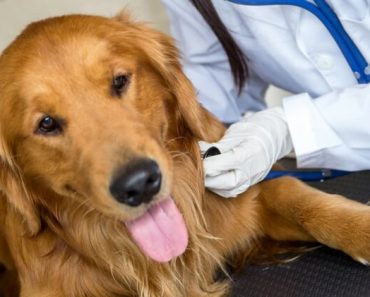Chances are, you’ve heard your vet mention heartworm disease before. Even if they haven’t gone into detail, it’s pretty easy to guess what the disease is — worms that set up home in a dog’s heart, lungs, and blood vessels. But did you know just how devastating it can be? Here’s the harsh reality: Heartworm disease is potentially deadly and any dog can get it. Cases are reported in all 50 states, and it’s expensive and difficult to cure. But, the good news: It’s preventable!
What Is Heartworm Disease?
Heartworm Disease is caused by a parasitic worm, Dirofilaria immitis. These worms set up home in a dog’s heart, lungs, and blood vessels, where they can cause devastating effects. Untreated, heartworm disease can be deadly. And, even with successful treatment, a dog may be left with permanent life-altering effects.
How Does A Dog Get Heartworm Disease?
Heartworm Disease is transmitted through infected mosquitos.
When an infected mosquito bites, they feast on a blood meal and can pass infective larvae into the dog. It takes infective larvae six months to mature into adult worms. Adult worms resemble long, thin, cooked strands of spaghetti and can grow to lengths of 12″ long. Males are usually between 4″ – 6″ and females 10″ – 12″. They have a lifespan between 5 – 7 years.
Get this: An infected dog can have anywhere from 1 to 250 worms living inside of him.

How Does A Mosquito Become Infected In The First Place?
It’s a vicious cycle. Just as a dog can get the disease from a mosquito, a mosquito first becomes infected from biting an infected dog, cat, ferret, or another animal that has it.
Here’s What Happens:
- When a dog is infected with heartworm, adult female worms reproduce. Their offspring are called microfilariae (baby worms). These microfilariae circulate in the dog’s bloodstream. When a mosquito comes along and bites an infected dog, the circulating microfilariae can pass from the dog into the mosquito during his blood meal.
- Next for the mosquito, there is an incubation period of 10 – 14 days before these baby worms (the microfilariae) can develop into infective larvae. At that point, the mosquito is armed and ready to infect its next canine victim.

Photo Via: HeartwormSociety.org
Take a minute to watch this video produced by the American Heartworm Society. It will give you a full visual and complete understanding of what this horrendous disease is, how it can infect a dog, why it can be so devastating, and prevention.
Can Humans Get Heartworm Disease?
According to the US Food And Drug Administration on fda.gov,
“People cannot get heartworms from their pets. Heartworms are only transmitted by the bite of an infected mosquito. In rare cases, people can get heartworms after being bitten by an infected mosquito. But because people are not a natural host for heartworms, the larvae usually migrate to the arteries of the heart and lungs and die before they become adult worms.”
Symptoms
At first, there aren’t any symptoms or you may notice a cough.
As the population of worms increase and begin to infest the heart and lungs, you may notice a chronic cough, shortness of breath, exercise intolerance, decreased appetite, weight loss, and weakness.
If untreated, the worm population can continue to increase. This disease can be deadly as the worms can cause blockages and damage to the heart, lungs, blood vessels, kidney, liver, and other organs.
Testing For Heartworm
According to the American Heartworm Society, all dogs should be tested for heartworm annually.
Heartworm testing is done via an antigen blood test. Since adult female heartworms release specific proteins known as antigens into a dog’s bloodstream, if these proteins are detected in the blood then the test will come back positive. If the blood test returns with a positive result, further testing will be done to confirm the diagnosis.

When Should A Dog Be Tested?
- At 7 months old and older.
- Prior to beginning prevention.
- Every 12 months even while on prevention to make sure the product is doing its job. Additionally, in case of missed or late doses it’s important to make sure the dog hasn’t become infected.
Treatment
Your veterinarian will discuss treatment options with you, but treatment almost always involves a hospital stay.
First, an injectable medication will be administered to kill the adult worms. It will be repeated on a schedule that’s appropriate for your dog’s particular needs. Additional medications will most likely be given to kill the baby worms and keep them from maturing.
As soon as treatment begins, the dog must be on strict confinement and rest. Activity must be limited, even for several weeks after treatment. That’s because as the worms are dying, they break up into fragments and debris, which can potentially cause blood vessels to become blocked. Occasionally additional treatment may be needed, and sometimes surgery will be required.
Heartworm treatment is expensive and very hard on the dog (and entire family). That’s why 12-month prevention is highly advised. If you aren’t using or don’t believe in prevention for whatever reason, do yourself and your canines a favor and make sure they are tested at least yearly. This way, if they were to become infected, you can catch and treat it early on.
Can My Other Dogs Catch It?
No. They can only get heartworms from the bite of an infected mosquito.
Prevention
Prevention is recommended for all dogs — 12 months a year. It comes in oral, topical, or injectable forms. You and your veterinarian will decide what’s best for your dog.
Why Heartworm Preventatives Should Never Be Given Late
It only takes one missed or late dose of prevention to open the window of susceptibility for heartworm infection.
According to The American Heartworm Society
“All approved heartworm medications work by eliminating the immature (larval) stages of the heartworm parasite. This includes the infective heartworm larvae deposited by the mosquito as well as the following larval stage that develops inside the animal. Unfortunately, in as little as 51 days, immature heartworm larvae can molt into an adult stage, which cannot be effectively eliminated by preventives. Because heartworms must be eliminated before they reach this adult stage, it is extremely important that heartworm preventives be administered strictly on schedule (monthly for oral and topical products and every 6 months for the injectable). Administering prevention late can allow immature larvae to molt into the adult stage, which is poorly prevented.”








